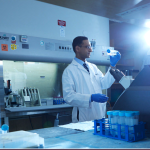Millions of Americans wear contact lenses, yet proper safety precautions are not often discussed.
This week, while many college students are on spring break, the Centers for Disease Control and Prevention is promoting healthy contact lens wear and care behaviors so students can safely enjoy their vacation.
We asked Dr. Deepinder K. Dhaliwal, professor of ophthalmology at the University of Pittsburgh School of Medicine and director of refractive surgery and cornea service at the UPMC Eye Center, about safety precautions when using contact lenses.
Why shouldn’t you sleep in contact lenses?
A. Wearing contact lenses to bed is extremely hazardous because it limits oxygen from getting to the eyes. Research shows sleeping in contacts increases infection rate by six to eight times, and in extreme cases, can result in vision loss. Although some students may be up late on Spring Break, it’s important for everyone to take their lenses out before bed.
Are cosmetic contact lenses OK to wear?
A. Contact lenses are often sold in souvenir shops, however you should never buy contact lenses over the counter. These lenses haven’t been regulated, and we have found they can be very harmful to eyes. There’s a large risk of pigment in the lenses coming off, leading to increased rate of infection. Contact lenses are devices that need to be monitored, so if you are interested in wearing cosmetic contact lenses, wait until after your vacation and see an eye doctor for a prescription.
What are the most important contact care tips to remember over spring break?
A. Naturally visiting the beach for a week involves swimming, but it’s important to remove contact lenses before jumping in the pool or ocean. Additionally, never clean contact lenses with saliva or tap water – always use a proper lens cleaning solution. Although its purified, tap water is not sterile and contains microbles that are harmful to the eye and can cause infection. I recommend storing contact cases away from the sink to reduce risk of tap water contamination. Always remember, there’s nothing better than a daily disposable contact.








